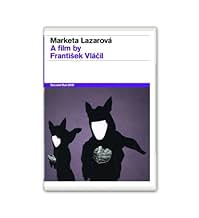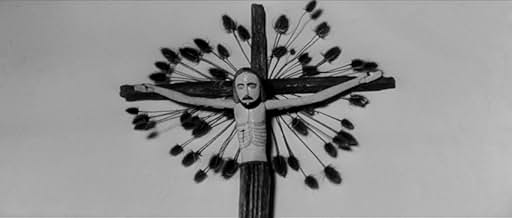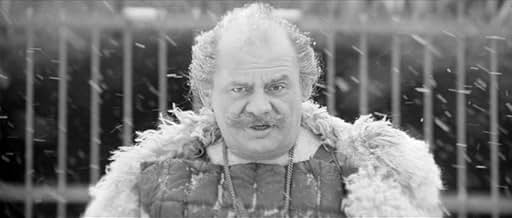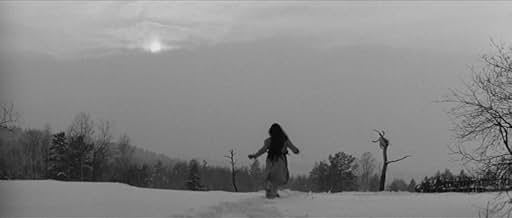VALUTAZIONE IMDb
7,8/10
6457
LA TUA VALUTAZIONE
Un cupo ritratto del passaggio dal paganesimo al cristianesimo nell'Europa centrale medievale: una giovane vergine promessa a Dio viene rapita e violentata da un predone che suo padre religi... Leggi tuttoUn cupo ritratto del passaggio dal paganesimo al cristianesimo nell'Europa centrale medievale: una giovane vergine promessa a Dio viene rapita e violentata da un predone che suo padre religioso in cambio cerca di uccidere.Un cupo ritratto del passaggio dal paganesimo al cristianesimo nell'Europa centrale medievale: una giovane vergine promessa a Dio viene rapita e violentata da un predone che suo padre religioso in cambio cerca di uccidere.
- Regia
- Sceneggiatura
- Star
- Premi
- 2 vittorie e 2 candidature totali
Recensioni in evidenza
The film's reputation very well precedes it; in the first moment that I learned of 'Marketa Lazarová,' I also learned it's regarded as perhaps the best Czech movie ever made. I can appreciate why - I'm not familiar with the novel the movie is adapted from, but the story is exquisite. The narrative is as bleak as it is expertly crafted, and deeply engrossing. There's strong attention to detail in all things - every shot, every article of the costume design, every sight of set design, and eye-catching filming locations. The vivid imagery of a historical drama becomes ever more stark captured in black and white, including the countenances of the actors. The assembled cast is outstanding - all those most prominent before the camera, of course (Magda Vásáryová above all, embodying the all-important title role with all due gravity) but even those in supporting roles, realizing every vivid emotion and tribulation. Factor in many extras as well, and the landscape of medieval Europe seems dazzlingly real and tangible.
However - for as superb as the narrative is, and for as excellent as the picture is as a whole, I cannot say it's perfect. I have a rather difficult time engaging with the film at points, especially in the first half. The presentation of the story is disjointed: some story beats, or facets of each plot point that would round them out, are not expressed clearly, or at all. There is a substantial amount of narrative that does not play out before the camera, or dialogue that is spoken by figures who are not on-screen, and the audience is left to pick up the pieces and discern what they may. Fine as the tale is, it's extremely difficult to truly parse it without an outside synopsis to provide the context and clarification that the feature does not. For all the characters that are introduced, and given plenty of attention at varying points, the fates of some are left vague. The end result is that 'Marketa Lazarová' comes off not just as historical fiction, but an art film ruthlessly indifferent to conventional narrative flow.
To be clear, I think this is a great, grand film. The story it tells is magnificent in and of itself, and complex, even as it's terribly grim. All technical aspects are fantastic, including the direction; the cast is swell; the writing, broadly, is marvelous. Some sequences are truly exceptional - outright phenomenal - particularly nearer the end. But there are also many ponderous gaps in the plot progression, and otherwise instances of inelegant telling, that gravely stymie the absolute mastery of cinema that the feature could and should have represented save for those faults. That 'Marketa Lazarová' nonetheless succeeds in being so splendid a work despite its flaws is a testament to the skills of all involved, but the deficiencies are unfortunate all the same.
The content is oppressively dreary, and the execution as a whole has no few problems. Still, for all that: the immense quality, from start to finish, manages to well outweigh the issues of its rendering. I think this is a superlative example of what cinema can achieve that deserves far greater renown outside the Czech Republic; would only that the blemishes could have been cleared up. For many reasons this won't be a film that everyone can enjoy, but if one can look past the sometimes laborious effort that the viewing experience represents, I dare say this is essential. Though regrettably imperfect, 'Marketa Lazarová' is a captivating, striking exemplar of film that earns my most hearty recommendation, and it's very much worth watching by whatever means one is able.
However - for as superb as the narrative is, and for as excellent as the picture is as a whole, I cannot say it's perfect. I have a rather difficult time engaging with the film at points, especially in the first half. The presentation of the story is disjointed: some story beats, or facets of each plot point that would round them out, are not expressed clearly, or at all. There is a substantial amount of narrative that does not play out before the camera, or dialogue that is spoken by figures who are not on-screen, and the audience is left to pick up the pieces and discern what they may. Fine as the tale is, it's extremely difficult to truly parse it without an outside synopsis to provide the context and clarification that the feature does not. For all the characters that are introduced, and given plenty of attention at varying points, the fates of some are left vague. The end result is that 'Marketa Lazarová' comes off not just as historical fiction, but an art film ruthlessly indifferent to conventional narrative flow.
To be clear, I think this is a great, grand film. The story it tells is magnificent in and of itself, and complex, even as it's terribly grim. All technical aspects are fantastic, including the direction; the cast is swell; the writing, broadly, is marvelous. Some sequences are truly exceptional - outright phenomenal - particularly nearer the end. But there are also many ponderous gaps in the plot progression, and otherwise instances of inelegant telling, that gravely stymie the absolute mastery of cinema that the feature could and should have represented save for those faults. That 'Marketa Lazarová' nonetheless succeeds in being so splendid a work despite its flaws is a testament to the skills of all involved, but the deficiencies are unfortunate all the same.
The content is oppressively dreary, and the execution as a whole has no few problems. Still, for all that: the immense quality, from start to finish, manages to well outweigh the issues of its rendering. I think this is a superlative example of what cinema can achieve that deserves far greater renown outside the Czech Republic; would only that the blemishes could have been cleared up. For many reasons this won't be a film that everyone can enjoy, but if one can look past the sometimes laborious effort that the viewing experience represents, I dare say this is essential. Though regrettably imperfect, 'Marketa Lazarová' is a captivating, striking exemplar of film that earns my most hearty recommendation, and it's very much worth watching by whatever means one is able.
"Marketa Lazarova" was a film I saw in 1970 at a small film theater in Minneapolis, Minnesota. It left an indelible memory, and I've spent years trying to find a way to see it again. At least once a year, I find a note I left about a phone call I've made to some obscure library or other such place in the hope of finding a way to see it.
The film won an Academy Award, and it should be remembered. It is stunning in black and white; the story is remarkable in its content and direction.
If anyone has ideas about how we fans can possibly revive this movie, we should try to do so. It is worth all the trouble and more just to see it again and again.
The film won an Academy Award, and it should be remembered. It is stunning in black and white; the story is remarkable in its content and direction.
If anyone has ideas about how we fans can possibly revive this movie, we should try to do so. It is worth all the trouble and more just to see it again and again.
I bought the Second Run DVD, after reading about how this epic was considered the best Czech film, ever.
To be honest, not many other contenders spring to mind. And, who voted? As it was on special offer and I am a sucker indeed for that Russian style of gritty monochrome composition and beauty, how could I resist?
I'm on its second play and I'm no nearer following the story. There is undoubtedly one. Am I too overawed by imagery that I could only dream of? (even if I were able to!) Is it the savagery and feel of a certain reality?
I don't know. I can sense, however, an art film made with passion and unbounded imagination. Of folklore, both in a historical sense and a cultural one and of religious rebellion. Like Kurosawa at his best, an immediacy and connection. Yet, it is also dreamlike and distant, with an air of mysticism that I found increasingly confusing. The length of film means that by halfway through I've no idea what is going on, but am still enjoying what I see.
Unfortunately, I have docked a mark for the forced, electronically induced echo on the dialogue that probably is supposed to denote that other worldly strangeness. It seems to seep in and hang about, its constant use here cheapens the effect to being a bit of a pain. Whereas Kurosawa used that SFX so effectively on, say Roshomon, by using just once or twice.
I could see elements of the Brazilian 'Black God, White Devil' and like others have commented, Kurosawa's 'Seven Samurai' and Tarkov's 'Andrei Rublev'. Maybe some of the black magic in Bergman's late medieval classics, such as 'The Virgin Spring' and 'The Seventh Seal'. But more psychotic, more manic and disturbing than all these put together. Like madness itself, there is a real beauty deeply ingrained amongst the mayhem.
My conclusion would have to be that if you get the chance, go for it. Take it with a large pinch of salt and sprinkle sparingly. None of it is truly horrific or unpalatable to most adults and don't worry if you don't "get it". Be slightly proud and immodest that you've found a tarnished gem that hardly anyone else will have seen or are ever likely to.
To be honest, not many other contenders spring to mind. And, who voted? As it was on special offer and I am a sucker indeed for that Russian style of gritty monochrome composition and beauty, how could I resist?
I'm on its second play and I'm no nearer following the story. There is undoubtedly one. Am I too overawed by imagery that I could only dream of? (even if I were able to!) Is it the savagery and feel of a certain reality?
I don't know. I can sense, however, an art film made with passion and unbounded imagination. Of folklore, both in a historical sense and a cultural one and of religious rebellion. Like Kurosawa at his best, an immediacy and connection. Yet, it is also dreamlike and distant, with an air of mysticism that I found increasingly confusing. The length of film means that by halfway through I've no idea what is going on, but am still enjoying what I see.
Unfortunately, I have docked a mark for the forced, electronically induced echo on the dialogue that probably is supposed to denote that other worldly strangeness. It seems to seep in and hang about, its constant use here cheapens the effect to being a bit of a pain. Whereas Kurosawa used that SFX so effectively on, say Roshomon, by using just once or twice.
I could see elements of the Brazilian 'Black God, White Devil' and like others have commented, Kurosawa's 'Seven Samurai' and Tarkov's 'Andrei Rublev'. Maybe some of the black magic in Bergman's late medieval classics, such as 'The Virgin Spring' and 'The Seventh Seal'. But more psychotic, more manic and disturbing than all these put together. Like madness itself, there is a real beauty deeply ingrained amongst the mayhem.
My conclusion would have to be that if you get the chance, go for it. Take it with a large pinch of salt and sprinkle sparingly. None of it is truly horrific or unpalatable to most adults and don't worry if you don't "get it". Be slightly proud and immodest that you've found a tarnished gem that hardly anyone else will have seen or are ever likely to.
Set in medieval times when paganism was still strong, follows the violent exploits of a small, well off clan.
Unlike most Hollywood 'history', the film does not just put modern people in ancient times, but attempts to reconstruct the society and lifestyle. Very fluid and poetic camera work.
This is not a film for everyone.
Unlike most Hollywood 'history', the film does not just put modern people in ancient times, but attempts to reconstruct the society and lifestyle. Very fluid and poetic camera work.
This is not a film for everyone.
I appreciate overseas even to notice this film, although I keep my doubt about the translation, for even the simplified movie dialogues are high-art and historizing. The film is based on Vladislav Vancura's brilliant novel (of the same name) its language level makes it untranslatable. It apparently caused my colleagues-in-comment some misunderstandings, for sure Czech King was no German in that time(even the christianity didn't come in our land germanways), only the noble man and his kidnapped son were.
This film is especially remarkable due to successful conversion of a great book into the great film (I don't recall many other examples at this level) and due to its capture of medieval. I hate medieval films with clean, stylish and crafty interiors, clothes etc. and bright light, for medieval was DARK, HARSH and DIRTY. What's the best part, Kozlik and Lazar were not just family-chieftains or family-heads, they were NOBLE MEN (feudals) and no matter whether they looked (and acted) like prowlers or not. Neither manners nor dresses were the significance of nobles in early medieval, the sword was (which no commoner was allowed to posses), better say swords and estates were.
This film is basically about weakness and strength in men. Lazar is thief and coward, kind of vulture, but Kozlik with his sons represents the willful and harsh power and bravery that summons an admiration of a sort, for they fear only the God, what makes them better christians than the sneaky Lazar jaws-full-of-Jesus.
Marketa, the unspoiled sweet child resembles all the clear, bright and pure in this world (and the only positive aspect of Lazar's sorry life), and is spoiled as everything clean and pure in this world might be. And she's devoted, first to God, then to earthly Mikolas.
I love the metaphore with zealot and little lamb, the connection between Marketa and the God's beast is obvious. Agnus Dei is another clear and bright to be tainted and consumpted by wild Kozlik's House.
And the sound and music, that's the world if its own, there's no music but sudden choir impacts!
This film is especially remarkable due to successful conversion of a great book into the great film (I don't recall many other examples at this level) and due to its capture of medieval. I hate medieval films with clean, stylish and crafty interiors, clothes etc. and bright light, for medieval was DARK, HARSH and DIRTY. What's the best part, Kozlik and Lazar were not just family-chieftains or family-heads, they were NOBLE MEN (feudals) and no matter whether they looked (and acted) like prowlers or not. Neither manners nor dresses were the significance of nobles in early medieval, the sword was (which no commoner was allowed to posses), better say swords and estates were.
This film is basically about weakness and strength in men. Lazar is thief and coward, kind of vulture, but Kozlik with his sons represents the willful and harsh power and bravery that summons an admiration of a sort, for they fear only the God, what makes them better christians than the sneaky Lazar jaws-full-of-Jesus.
Marketa, the unspoiled sweet child resembles all the clear, bright and pure in this world (and the only positive aspect of Lazar's sorry life), and is spoiled as everything clean and pure in this world might be. And she's devoted, first to God, then to earthly Mikolas.
I love the metaphore with zealot and little lamb, the connection between Marketa and the God's beast is obvious. Agnus Dei is another clear and bright to be tainted and consumpted by wild Kozlik's House.
And the sound and music, that's the world if its own, there's no music but sudden choir impacts!
Lo sapevi?
- QuizFrantisek Vlácil not only had the clothes painstakingly researched and hand-sewn, he had the cast live in the forest for the two years of shooting so they could get into the 13th century mindset.
- BlooperIn a scene where Marketa observes a reindeer in the forest, you can see a director Frantisek Vlácil in jacket in the left of the frame. He was actually trying to scare deer, because they didn't want to move. This could be seen only on some of the Blu-Ray and DVD versions.
- Versioni alternativeThe UK release was cut, a cut was required to remove sight of a snake being stabbed and rearing up in pain, in order to obtain a 15 classification. The cut was made on the basis of BBFC policy on genuine animal cruelty. An uncut classification was not available.
- ConnessioniEdited into CzechMate: In Search of Jirí Menzel (2018)
I più visti
Accedi per valutare e creare un elenco di titoli salvati per ottenere consigli personalizzati
- How long is Marketa Lazarová?Powered by Alexa
Dettagli
- Tempo di esecuzione2 ore 42 minuti
- Colore
- Mix di suoni
- Proporzioni
- 2.35 : 1
Contribuisci a questa pagina
Suggerisci una modifica o aggiungi i contenuti mancanti

![Guarda Trailer [OV]](https://m.media-amazon.com/images/M/MV5BOGZhMmFmMGQtNGZhMi00M2QzLWExMjItZjJkZTVhMmEzYzJjXkEyXkFqcGdeQXRyYW5zY29kZS13b3JrZmxvdw@@._V1_QL75_UX500_CR0)



























